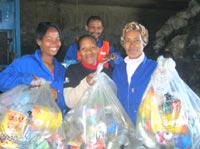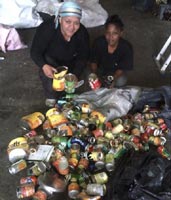With National Women's Day coming up on 9 August, Collect-a-Can would like to recognise some inspirational women who have shown strength, tenacity and discipline to improve their own lot and those of others. When faced with adversity, they chose to take initiative and created their own futures.
Free State fighter
Lydia Tsosane (39), owner of Tsosane Waste Management, Ladybrand, Free State Province had a matric certificate but no tertiary qualifications and, as a single mother, was battling to find a job and to provide for herself and her two children. In 2007, she read an article in the newspaper advertising Collect-a-Can and its "cash for cans" incentive. Having nothing to lose, she called Collect-a-Can to find out how she could get involved. "I realised that this was a business that didn't need too much capital outlay to get started so I decided to try it," Tsosane says. "I spoke to the regional manager at Collect-a-Can's Aeroton branch and he came out to see the areas that I was planning to collect in and to discuss my plans."
She was fortunate that Collect-a-Can provided her with a baling machine right from the start. She now employs four people in her operation, two men to operate the baling machine and two women to sort the cans. She buys cans from the dumping site and has placed collection bins in numerous public locations. "We also run a buy back centre where waste collectors, municipal workers and children come to sell us recyclables," Tsosane says. "We operate as a multi-waste centre, collecting plastic, glass and paper over and above the cans. We wouldn't survive if we only collected one type of waste."
Her advice to others wanting to follow her example is, "Don't go into this just looking for money. You will need to love the business and work very hard to meet the tonnages required by the company. My suggestion is for all women to pull up their socks and start their own businesses. I have worked very hard but it has paid off. My lifestyle is far better now and I have ensured a brighter future for my children."
Western Cape winners
Sonia Frans, owner of EnviroSmart, Western Cape, spent ten years of her life working for the municipality, overseeing both solid and liquid waste. During this time, she developed a passion for the industry and became concerned with waste minimization and the lessening of waste to landfill. She also recognised the need to educate people about waste and recycling.
Frans began her own recycling business in 2007, starting out in her backyard where she operated for three years. She now has a fully-fledged sorting facility on municipal premises and her business employs 16 fulltime staff members and 9-12 casual workers. The waste that comes into the business is collected mostly from households in the Drakenstein municipal area, where residents separate their recyclable waste from regular refuse. Employees sort the recyclable waste, separating cans, paper, plastics, metal, glass, e-waste, cooking oil and motor oil. All the cans collected are sold on to Collect-a-Can, where they are processed for recycling.
Being situated close to both urban and rural environments, Frans has taken the initiative to start farm projects, encouraging farmers to recycle their waste rather than burn it. She also engages with the farm workers, as she believes that they need to understand why they are being requested to observe recycling practices.
Additionally, she runs awareness campaigns at schools in the area in order to encourage and educate learners about the need to minimise waste. Frans says, "I believe in a hands-on approach and find fulfilment in getting physically involved with the work. I'm proud that my business prevents unnecessary waste from ending up in landfills, and delighted to be recognised as one of a growing number of entrepreneurial women in the waste industry."
The value of recycling
Lydia Anderson-Jardine, owner of Waste-Want, Stikland, Western Cape, started her recycling and buy-back facility two years ago. Needing to earn some extra money for her family, she decided to turn her passion for waste minimization and environmental sustainability into a viable business. She had previously worked as a councillor with the City of Cape Town, focusing on integrated waste management, so was knowledgeable about the industry and this worked to her advantage.
Her business now employs 20 staff members and sorts most recyclable waste streams. The company works extensively with Collect-a-Can in educating learners and the governing bodies of twelve to fourteen schools in the region about the value of recycling. In particular they communicate to less advantaged schools that they can easily boost their funds by collecting cans for recycling as they get paid for their collections and can win extra money in the schools competition by collecting the most cans in their region.
Anderson-Jardine feels strongly that women have an important role to play in the waste management industry, which has traditionally been a male orientated preserve. "I believe that women can really help to empower one another and to this end, I have awarded two of my most loyal staff members shares in the company. These women took ownership of their jobs and play a vital role in running the company. I understand that these ladies see the same vision as I do and am blessed that I can surround myself with a team of trusted people who share my passion."
Anderson-Jardine would like to encourage all women who feel passionate about the environment to put their passion and energy to good use by getting involved in the waste management industry.
For more, go to www.collectacan.co.za.



































